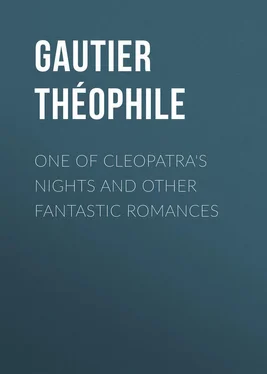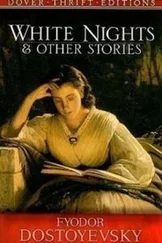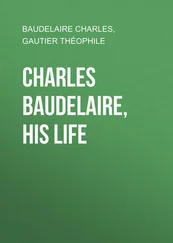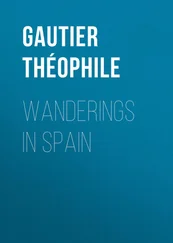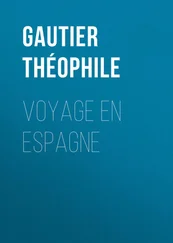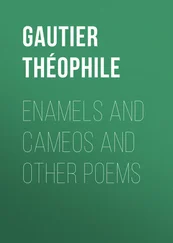Théophile Gautier - One of Cleopatra's Nights and Other Fantastic Romances
Здесь есть возможность читать онлайн «Théophile Gautier - One of Cleopatra's Nights and Other Fantastic Romances» — ознакомительный отрывок электронной книги совершенно бесплатно, а после прочтения отрывка купить полную версию. В некоторых случаях можно слушать аудио, скачать через торрент в формате fb2 и присутствует краткое содержание. Издательство: Иностранный паблик, Жанр: foreign_antique, foreign_prose, short_story, на английском языке. Описание произведения, (предисловие) а так же отзывы посетителей доступны на портале библиотеки ЛибКат.
- Название:One of Cleopatra's Nights and Other Fantastic Romances
- Автор:
- Издательство:Иностранный паблик
- Жанр:
- Год:неизвестен
- ISBN:нет данных
- Рейтинг книги:3 / 5. Голосов: 1
-
Избранное:Добавить в избранное
- Отзывы:
-
Ваша оценка:
- 60
- 1
- 2
- 3
- 4
- 5
One of Cleopatra's Nights and Other Fantastic Romances: краткое содержание, описание и аннотация
Предлагаем к чтению аннотацию, описание, краткое содержание или предисловие (зависит от того, что написал сам автор книги «One of Cleopatra's Nights and Other Fantastic Romances»). Если вы не нашли необходимую информацию о книге — напишите в комментариях, мы постараемся отыскать её.
One of Cleopatra's Nights and Other Fantastic Romances — читать онлайн ознакомительный отрывок
Ниже представлен текст книги, разбитый по страницам. Система сохранения места последней прочитанной страницы, позволяет с удобством читать онлайн бесплатно книгу «One of Cleopatra's Nights and Other Fantastic Romances», без необходимости каждый раз заново искать на чём Вы остановились. Поставьте закладку, и сможете в любой момент перейти на страницу, на которой закончили чтение.
Интервал:
Закладка:
Théophile Gautier
One of Cleopatra's Nights and Other Fantastic Romances
The love that caught strange light from death's own eyes,
And filled death's lips with fiery words and sighs,
And, half asleep, let feed from veins of his
Her close, red, warm snake's-mouth, Egyptian-wise:
And that great night of love more strange than this,
When she that made the whole world's bale and bliss
Made king of the whole world's desire a slave
And killed him in mid-kingdom with a kiss.
" Memorial verses on the death of Théophile Gautier ."
TO THE READER
The stories composing this volume have been selected for translation from the two volumes of romances and tales by Théophile Gautier respectively entitled Nouvelles and Romans et Contes . They afford in the original many excellent examples of that peculiar beauty of fancy and power of painting with words which made Gautier the most brilliant literary artist of his time. No doubt their warmth of coloring has been impoverished and their fantastic enchantment weakened by the process of transformation into a less voluptuous tongue; yet enough of the original charm remains, we trust, to convey a just idea of the French author's rich imaginative power and ornate luxuriance of style.
The verses of Swinburne referring to the witchery of the novelette which opens the volume, and to the peculiarly sweet and strange romance which follows, sufficiently indicate the extraordinary art of these tales. At least three of the stories we have attempted to translate rank among the most remarkable literary productions of the century.
These little romances are characterized, however, by merits other than those of mere literary workmanship; they are further remarkable for a wealth of erudition – picturesque learning, we might say – which often lends them an actual archæologic value, like the paintings of some scholarly artist, some Alma Tadema, who with fair magic of color-blending evokes for us eidolons of ages vanished and civilizations passed away.
Thus one finds in the delightful fantasy of Arria Marcella not only a dream of "Pompeiian Days," pictured with an idealistic brilliancy beyond the art of Coomans, but a rich knowledge, likewise, of all that fascinating lore gleaned by antiquarian research amid the ashes of the sepultured city – a knowledge enriched in no small degree by local study, and presented with a descriptive power finely strengthened by personal observation. It is something more than the charming imagination of a poetic dreamer which paints for us the blue sea "unrolling its long volutes of foam" upon a beach as black and smooth as sifted charcoal; the fissured summit of Vesuvius, out-pouring white threads of smoke from its crannies "as from the orifices of a perfuming pan;" and the far-purple hills "with outlines voluptuously undulating, like the hips of a woman."
And throughout these romances one finds the same evidences of archæologic study, of artistic observation, of imagination fostered by picturesque fact. The glory of the Greek kings of Lydia glows goldenly again in the pages of Le Roi Candaule ; the massive gloom and melancholy weirdness of ancient Egypt is reflected as in a necromancer's mirror throughout Une Nuit de Cléopâtre . It is in the Egyptian fantasies, perhaps, that the author's peculiar descriptive skill appears to most advantage; the still fresh hues of the hierophantic paintings, the pictured sarcophagi, and the mummy-gilding seem to meet the reader's eye with the gratification of their bright contrasts; a faint perfume of unknown balm seems to hover over the open pages; and mysterious sphinxes appear to look on "with that undefinable rose-granite smile that mocks our modern wisdom."
Excepting Omphale and La Morte Amoureuse, the stories selected for translation are mostly antique in composition and coloring; the former being Louis-Quinze, the latter mediæval rather than aught else. But all alike frame some exquisite delineation of young love-fancies; some admirable picture of what Gautier in the Histoire du Romantisme has prettily termed "the graceful succubi that haunt the happy slumbers of youth."
And what dreamful student of the Beautiful has not been once enamoured of an Arria Marcella, and worshipped on the altar of his heart those ancient gods "who loved life and youth and beauty and pleasure"? How many a lover of mediæval legend has in fancy gladly bartered the blood of his veins for some phantom Clarimonde? What true artist has not at some time been haunted by the image of a Nyssia, fairer than all daughters of men, lovelier than all fantasies realized in stone – a Pygmalion-wrought marble transmuted by divine alchemy to a being of opalescent flesh and ichor-throbbing veins?
Gautier was an artist in the common acceptation of the term, as well as a poet and a writer of romance; and in those pleasant fragments of autobiography scattered through the Histoire du Romantisme we find his averment that at the commencement of the Romantic movement of 1830 he was yet undecided whether to adopt literature or art as a profession; but, finding it "easier to paint with words than with colors," he finally decided upon the pen as his weapon in the new warfare against "the hydra of classicism with its hundred peruked heads." As a writer, however, he remained the artist still. His pages were pictures, his sentences touches of color; he learned, indeed, to "paint with words" as no other writer of the century has done; and created a powerful impression, not only upon the literature of his day, but even, it may be said, upon the language of his nation.
Possessed of an almost matchless imaginative power, and a sense of beauty as refined as that of an antique sculptor, Gautier so perfects his work as to leave nothing for the imagination of his readers to desire. He insists that they should behold the author's fancy precisely as the author himself fancied it with all its details; the position of objects, the effects of light, the disposition of shadow, the material of garments, the texture of stuffs, the interstices of stonework, the gleam of a lamp upon sharp angles of furniture, the whispering sound of trailing silk, the tone of a voice, the expression of a face – all is visible, audible, tangible. You can find nothing in one of his picturesque scenes which has not been treated with a studied accuracy of minute detail that leaves no vacancy for the eye to light upon, no hiatus for the imagination to supply. This is the art of painting carried to the highest perfection in literature. It is not wonderful that such a man should at times sacrifice style to description; and he has himself acknowledged an occasional abuse of violent coloring.
Naturally, a writer of this kind pays small regard to the demands of prudery. His work being that of the artist, he claims the privilege of the sculptor and the painter in delineations of the beautiful. A perfect human body is to him the most beautiful of objects. He does not seek to veil its loveliness with cumbrous drapery; he delights to behold it and depict it in its "divine nudity;" he views it with the eyes of the Corinthian statuary or the Pompeiian fresco-painter; he idealizes even the ideal of beauty: under his treatment flesh becomes diaphanous, eyes are transformed to orbs of prismatic light, features take tints of celestial loveliness. Like the Hellenic sculptor, he is not satisfied with beauty of form alone, but must add a vital glow of delicate coloring to the white limbs and snowy bosom of marble.
It is the artist, therefore, who must judge of Gautier's creations. To the lovers of the loveliness of the antique world, the lovers of physical beauty and artistic truth, of the charm of youthful dreams and young passion in its blossoming, of poetic ambitions and the sweet pantheism that finds all Nature vitalized by the Spirit of the Beautiful – to such the first English version of these graceful fantasies is offered in the hope that it may not be found wholly unworthy of the original.
Читать дальшеИнтервал:
Закладка:
Похожие книги на «One of Cleopatra's Nights and Other Fantastic Romances»
Представляем Вашему вниманию похожие книги на «One of Cleopatra's Nights and Other Fantastic Romances» списком для выбора. Мы отобрали схожую по названию и смыслу литературу в надежде предоставить читателям больше вариантов отыскать новые, интересные, ещё непрочитанные произведения.
Обсуждение, отзывы о книге «One of Cleopatra's Nights and Other Fantastic Romances» и просто собственные мнения читателей. Оставьте ваши комментарии, напишите, что Вы думаете о произведении, его смысле или главных героях. Укажите что конкретно понравилось, а что нет, и почему Вы так считаете.
